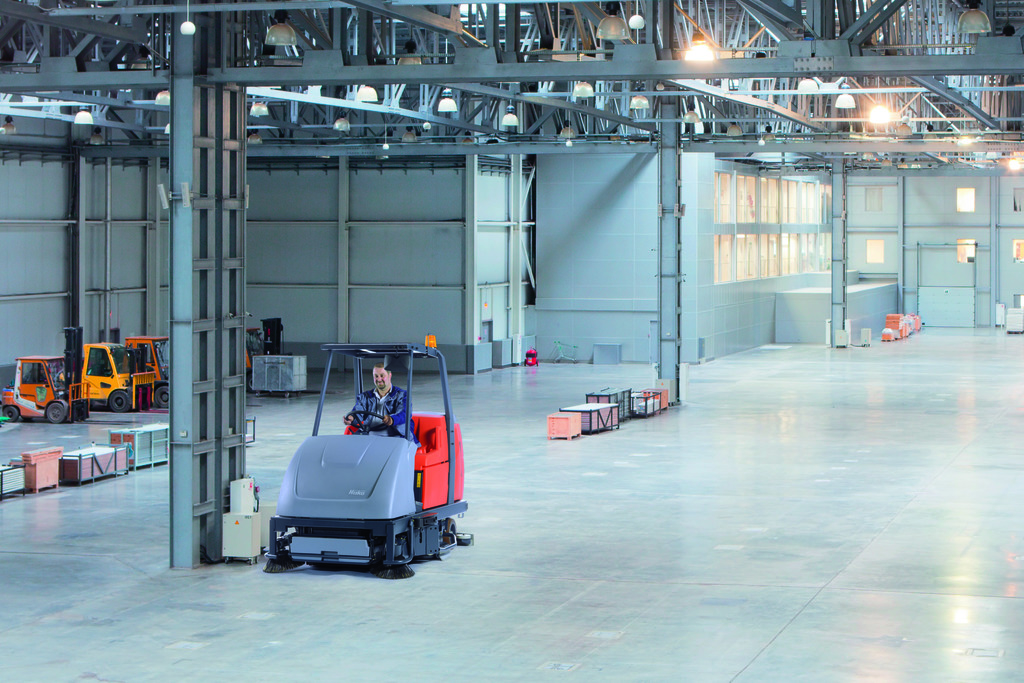
Kelly Rose
Editor

Kelly Rose
Editor
Sylvie Giangolini from Hako explains why failing to keep warehouses and industrial premises clean and clear of debris can result in very real costs for businesses
In many working environments, from warehouses to manufacturing plants, the cost of moving materials on site represents a significant cost for businesses, with serious thought given to finding the most efficient and effective handling solution.
Companies may invest hundreds of thousands of pounds in forklift trucks or other materials handling equipment in the hope of reducing costs and improving efficiency. However, by ignoring what is quite literally under their feet, fleet operators, site managers and equipment operators risk running up unnecessarily high maintenance and repair costs – not to mention putting the health and safety of employees and site visitors at risk.
The hazards
Poorly cleaned floors can hide a range of risks to both people and equipment. Excessive dirt and grime obscure surface damage such as potholes, cracks and ridges which, as well as increasing the risks of trips and falls for pedestrians, can cause trucks to ‘bottom out’. Such incidents can lead to damage to wheels, chassis and even the drive train.
According to a leading materials handling solutions provider, replacing a wheel on a forklift truck can cost anything from £50 to hundreds of pounds and damage to an engine or drive train can run into the thousands.
Less dramatic, but perhaps even more costly in the longer term, is the increased wear and tear on tyres that results from poorly maintained and cleaned floors. Equally loose debris, including pallet wrap, sawdust and paper are all common causes of blocked radiators and in-effective air filters. They also damage wheel bearing, shaft bearings and seals.
In many warehouses, pallet wrap can present a dangerous hazard as it can not only get wrapped around wheels and axels of handling equipment, it is one of the most common causes of personal injury through trips and falls.
It’s not just dirt on the floor that can cause problems. Airborne dust can also block filters and infiltrate other vital components, reducing the time between services, increasing the risk of breakdown and therefore increasing costs as a result of repairs and truck downtime.
Of course, dust isn’t just a threat to expensive equipment. Failing to tackle the problem can have a human impact – long term exposure for employees can result in a range of health problems. These can be devastating for the person concerned but also costly for the employer in terms of working days lost through illness and possible compensation claims.
In some working environments dust and other particulate debris can present a risk of explosion and, of course, any build-up of potentially flammable rubbish presents an obvious fire hazard.
Take advantage of technology
Whilst it is unrealistic to expect workplaces to remain spotless at all times, the latest developments in cleaning technology have made the task of reducing the risks much easier. The current generation of sweepers, scrubber driers and even combination machines can operate quickly and efficiently for long periods to make continuous cleaning a realistic proposition.
For example, the latest range of Hako ride on scrubber driers feature large water tanks for long, uninterrupted periods of operation and powerful batteries for increased run time. They have also been designed with maximum manoeuvrability, and are able to turn in narrow aisles and get close up to racking. The patented Aqua Stop brushes reduces water and chemical usage by up to 50% over the life of the machine.
As no two workplaces are the same, it’s important to consider the wide range of options available. In some circumstances, where constant cleaning of a very large area is required, then a scrubber drier may provide the ideal solution – but it may not be the most cost effective solution for all environments. In some cases a thorough sweep is needed on a daily basis, with a wet/dry clean taking place once a week – in this scenario, a separate sweeper and a scrubber/dryer may prove more cost effective.
With businesses putting so much effort into specifying materials handling equipment, it’s essential they pay the same attention to their cleaning equipment – especially with so many options now available. In doing so they’ll be able to maximise the benefits of their investment whilst contributing to wider improvements in workplace health and safety.


Eldon Close
Crick
NN6 7SL
UNITED KINGDOM
01788 825600